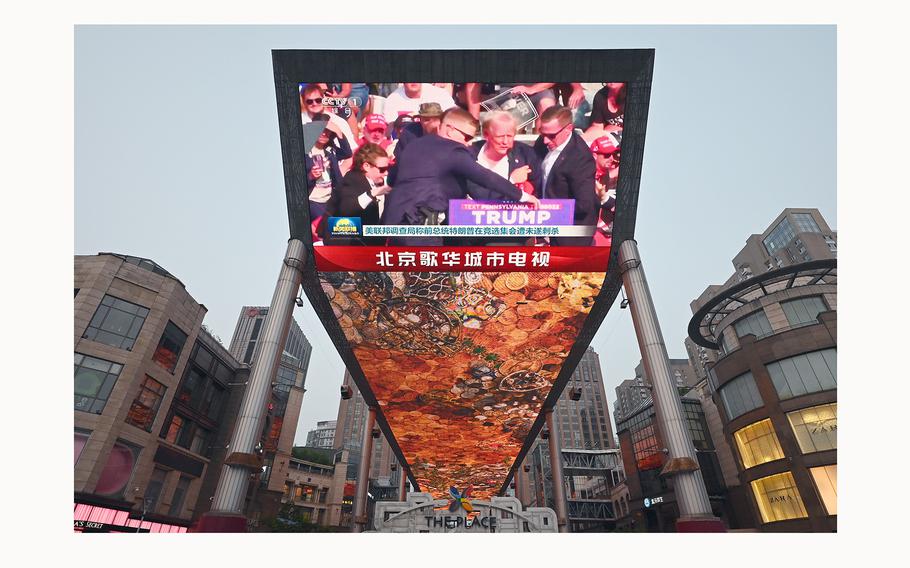
A news programme about the assassination attempt on former President Donald Trump is seen on a giant screen at a shopping mall in Beijing July 14, 2024. (Greg Baker/AFP/Getty Images/TNS)
TAIPEI, Taiwan (Tribune News Service) — In China, the message of former President Trump’s assassination attempt was clear: Just another sign of its biggest rival’s inevitable decline.
The Global Times, a Communist Party-run tabloid, wrote that the shooting Saturday in Pennsylvania was a symptom of an increasingly divided and disorderly nation.
A cartoon from the publication titled “Democracy in Danger” depicted a wave of water labeled “political violence” rising to overtake the Statue of Liberty.
“Such violence is likely to become more frequent as the country is further polarized,” the paper wrote. “The shooting also exposed the high degree of instability and unpredictability of U.S. politics, further triggering doubts among its allies over Washington’s leadership.”
On Saturday, a gunman opened fire at a Trump rally, killing one attendee and striking the former president’s right ear. The gunman, whose motives remain under investigation, was shot and killed by Secret Service agents.
Across much of the world, the attack was greeted with shock, horror and expressions of sympathy. But many U.S. enemies and rivals were quick to say it symbolizes the dwindling power and hypocrisy of American democracy and global leadership.
Chinese predictions of America’s decline aren’t new. In 1991, Wang Huning, a senior leader of China’s Communist Party, published a book titled “America Against America,” recounting his time in the U.S. and what he saw as the flaws of capitalism and democracy that undermined the country’s future.
At that time, the U.S. was firmly seen as a world leader in economic development and international diplomacy, while China was just beginning to engage in global affairs. But as China’s influence and economic power have grown, so have tensions between the two nations.
Under President Xi Jinping, who has encouraged nationalism and increased internet and media censorship, such narratives of America’s demise have become more prevalent. Discord in the U.S. over the past few years has only bolstered China’s case.
During the pandemic, China touted its ability to contain the spread of the virus, in contrast to surging infections in the U.S., as an example of its superior governance. Chinese commentators have also pointed to the Jan. 6 Capitol attack, Black Lives Matter protests, mass shootings and perceived weaknesses of this year’s two presidential candidates as further evidence of the shortcomings of Western democracy.
“These kinds of incidents, this kind of political violence, fits with that narrative that America is a failing political system,” said Pradeep Taneja, senior lecturer on Asian politics at the University of Melbourne. “A weaker America, a divided America, that’s good for China.”
China is facing a host of domestic issues, including a stagnating economy, declining birth rates and growing malaise among its middle class. In the last couple years, the number of Chinese migrants arriving at the U.S. border has surged, after undertaking dangerous journeys through Latin America in hopes for economic opportunity and political freedom.
However, a Global Times report said that the Chinese public’s perception of America has turned more negative over the past several years. In a 2021 survey by the state-run outlet, 8.1% of respondents believed China should “look up to the West,” compared to 37.2% five years prior.
In the U.S., unfavorable views of China have grown even more sharply, polls show.
Fewer Chinese young people see the U.S. as more attractive alternative, said Mallie Prytherch, a researcher with the Centre on Contemporary China, who did a 2022 survey of Chinese college students.
“Just because they had been disillusioned by the Chinese system did not mean they saw the Western systems as something they wanted,” she said.
Xi, who took office in 2013, has presented China as an alternative style of global leadership to what he sees as Western hegemony, strengthening ties with U.S. adversaries like Russia and North Korea and courting the friendship of other countries in the Asia-Pacific through trade and diplomatic visits.
Chinese officials have said little about the shooting. A spokesperson for the Ministry of Foreign Affairs said Xi had extended his sympathies to Trump and was following the situation. But the assassination attempt was widely discussed on Chinese social media, where even high-profile academics propagated conspiracy theories of the gunman’s motives. Many agreed that the shooting would likely boost Trump’s chances at winning reelection.
There is likely no beneficial outcome for China come November, as both Trump and President Biden have sought to prove themselves hard-line negotiators in the deteriorating U.S.-China relationship. Analysts said that while Trump is more unpredictable than Biden, his election could also undermine America’s alliances with other countries, giving China an opportunity to strengthen its own foothold in regions like Asia and the Middle East.
“They’re putting forward this idea that there is this deep internal division in the U.S. that really affects its ability to be a leader on the world stage,” Prytherch said. “From an American point of view, this is a moment in history. But in China, this is just another act of violence in America.”
Special correspondent Xin-yun Wu in Taipei contributed to this report.
©2024 Los Angeles Times.
Visit at latimes.com.
Distributed by Tribune Content Agency, LLC.